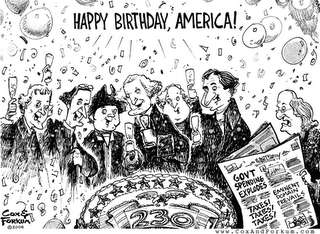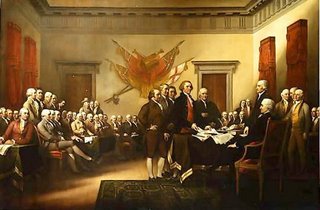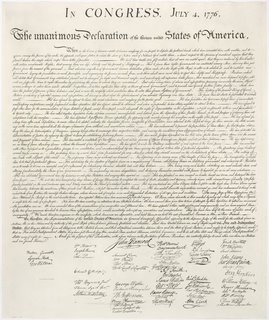 Bernard Darnton's legal challenge to Helen Clark is intended as a reminder to all politicians in this country that they are not above the law, and that even in our present parlous state their are still some constitutional impediments to absolute rule.
Bernard Darnton's legal challenge to Helen Clark is intended as a reminder to all politicians in this country that they are not above the law, and that even in our present parlous state their are still some constitutional impediments to absolute rule. It was thinking such as this, after all, that inspired the American War of Independence and the writing of the Declaration of Indepence that is celebrated today on July 4th. The message of the Fourth is an international one.
It was thinking such as this, after all, that inspired the American War of Independence and the writing of the Declaration of Indepence that is celebrated today on July 4th. The message of the Fourth is an international one.Springing from the same intellectual roots as was the 1688 Bill of Rights -- and nourished by the thoughts of John Locke that stood behind that landmark document -- Thomas Jefferson and his fellows declared themselves in rebellion against the British King who had enacted (they charged), a long string of usurpations and abuses against the colonists, which the Declararation went on to enumerate, and the colonists went on to remedy.
As John Locke had declared the right of rebellion in such circumstances, so Jefferson and his fellows claimed that right for themselves, and so began the American Revolution.
It was called a Revolution because -- like the wheel from which the term comes -- these revolutionaries were seeking not just to overthrow bad government, but to return again to good government. Their aim was to put Government by Right back in the saddle from whence it had turned.
Where Locke's 1688 Bill of Rights and the Glorious Revolution it accompanied brought Constitutional Monarchy to England, so the American Revolution and the Declaration and Constitution that accompanied it brought a Constitutional Republic to the United States. As constitutional scholar David Mayer affirms, the result was a Republic, not a Democracy -- a republic in which the Government was chained up constitutionally to act as the guardian of its citizens' rights and liberties, rather than left unleashed to savage them.
Said Thomas Jefferson in the last letter he was to write, reflecting fifty years later on the Declaration of Independence and the July 4 celebrations that commemorate its signing:
May it be to the world, what I believe it will be (to some parts sooner, to others later, but finally to all), the signal of arousing men to burst the chains under which monkish ignorance and superstition had persuaded them to bind themselves, and to assume the blessings and security of self-government. That form which we have substituted, restores the free right to the unbounded exercise of reason and freedom of opinion. All eyes are opened, or opening, to the rights of man. The general spread of the light of science has already laid open to every view the palpable truth, that the mass of mankind has not been born with saddles on their backs, nor a favored few booted and spurred, ready to ride them legitimately, by the grace of God. These are grounds of hope for others. For ourselves, let the annual return of this day forever refresh our recollections of these rights, and an undiminished devotion to them.Amen. And let those thoughts be heard around the world! For as one commentator said on this day last year, July 4th is not just a National Day for Americans because the Declaration of Independence really is "freedom's anthem heard around the world":
Whenever you hear news of people fighting for democracy, pause and give thanks for the Declaration of Independence. I am thankful every day that by blind luck I was born in this country. I want the whole world to have the comforts and the opportunities that have so enriched my life. When they tear down a wall in Berlin, when an oppressed group is granted a right in Latin America, when a business is allowed to exist in China, a protest is allowed in a former Soviet satellite, a woman attends a school in Afghanistan or a purple forefinger is raised in Iraq, I think to myself, “the world may not know all the lyrics, but they are definitely singing our song.”
 And he's right. America was the nation of the Enlightenment, and her Declaration crystallised the political achievement of the Enlightenment: the development of the concept of rights. With the exception of just a few words*, the words could not be bettered today (although some of us have tried):
And he's right. America was the nation of the Enlightenment, and her Declaration crystallised the political achievement of the Enlightenment: the development of the concept of rights. With the exception of just a few words*, the words could not be bettered today (although some of us have tried):We hold these truths to be self-evident, that all men are created equal, that they are endowed by their Creator with certain unalienable Rights, that among these are Life, Liberty, and the pursuit of Happiness. That to secure these rights, Governments are instituted among Men, deriving their just powers from the consent of the governed. That whenever any Form of Government becomes destructive of these ends, it is the Right of the People to alter or to abolish it, and to institute new Government, laying its foundation on such principles and organizing its powers in such form, as to them shall seem most likely to effect their Safety and Happiness...
A wonderful, wonderful anthem to freedom that rings down through the years. If only the real meaning of those words could be heard and undeerstood. As David Mayer says:To really celebrate Independence Day, Americans must rededicate themselves to the principles of 1776, and particularly to the absolute importance of individual rights – not the pseudo-rights imagined by proponents of the welfare state, but the genuine rights (properly understood) of individuals to life, liberty and the pursuit of happiness. We must also rededicate ourselves to the Declaration’s standard for the legitimacy of government – a government that is limited to the safeguarding of these rights, not to their destruction – and, with this, an acceptance of the principle that outside this sphere of legitimacy, individuals have the freedom (and the responsibility) of governing themselves.If Americans are to use this day to re-dedicate themselves to the principles of 1776 as Mayer invites, then non-Americans might use it to take up Thomas Jefferson's challenge "to burst the chains under which monkish ignorance and superstition had persuaded [us] to bind [ourselves], and to assume the blessings and security of self-government."
 New Zealand Libertarianz have provided such an opportunity with Bernard Darnton's reminder to NZ parliamentarians of the constitutional chains that do exist even in New Zealand, and they have provided it too with a Constitution for New Freeland -- a document intended as the full-fledged constitutional chain that the US Constitution promised to be but finally wasn't.
New Zealand Libertarianz have provided such an opportunity with Bernard Darnton's reminder to NZ parliamentarians of the constitutional chains that do exist even in New Zealand, and they have provided it too with a Constitution for New Freeland -- a document intended as the full-fledged constitutional chain that the US Constitution promised to be but finally wasn't.On this day, and at this time, I commend them to your attention, and I invite your own dedication to the principles of 1776 in your own chosen way. They are after all principles worthy of clasping to your bosom.
* * * * *
* I said above: "With the exception of just a few words, the words could not be bettered today." The main improvements needed would be to remedy the omission of property rights, of God's 'creation' of rights, and of the 'self-evidence' of rights. It seems churlish to carp, but as errors these are serious ones.LINKS: Declaration of Independence - Hypertext Edition
A Republic, not a Democracy - David Mayer
The meaning of Independence Day - David Mayer
Constitution for New Freeland - Libertarianz
Darnton Vs Clark
TAGS: Politics-US, History, Constitution, Darnton V Clark
1 comment:
"A wonderful, wonderful anthem to freedom that rings down through the years."
Oh yes! Amen to that.
And best wishes to our American friends on this day.
Post a Comment